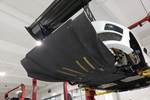Ford GT composite supercar is going out of production in 2022
Ford is rolling out its seventh special edition of the car, which features an abundance of carbon fiber.
Share
Read Next

The 1964 Ford GT Prototype (chassis GT/105) is on the left and the modern interpretation, the 2022 Ford GT ’64 Heritage Edition is on the right. The prototype is just one of three original Ford GTs still in existence. Photo Credit: Ford
The Ford GT — which was introduced in 2015 as the company put it, a “carbon fiber supercar,” as the vehicle features a carbon fiber passenger cell and structural carbon fiber body panels — will be going out of production in 2022.
However, the company is far from done with the car. Instead, the company has developed a new version, the 2022 Ford GT ’64 Heritage Edition, which is a tribute to the original prototype vehicles that were produced and led to the GT40 vehicles that won at LeMans 1-2-3 in 1966 (the Ford v Ferrari win).
For this limited-edition model, the company is showing off carbon fiber in several applications:
- Twenty-inch carbon fiber wheels (which are painted “Antimatter Blue”)
- Exposed carbon fiber front splitter, side sills, mirror stalks, engine louvers and rear diffuser
- Carbon fiber door sills, lower A-pillars and registers
The original Ford GT prototype debuted at the New York Auto Show on April 3, 1964. A couple weeks later it was completely overshadowed by the introduction of the original Ford Mustang at the World’s Fair in Flushing Meadows, New York, on April 17.
In total there were five prototypes built. Chassis GT/101 and GT/102 were scrapped after testing. GT/103, GT/104 and GT/105 still exist, but only GT/105 has the period-correct livery, which the new special-edition car pays homage to.
Related Content
-
Welding is not bonding
Discussion of the issues in our understanding of thermoplastic composite welded structures and certification of the latest materials and welding technologies for future airframes.
-
The lessons behind OceanGate
Carbon fiber composites faced much criticism in the wake of the OceanGate submersible accident. CW’s publisher Jeff Sloan explains that it’s not that simple.
-
Infinite Composites: Type V tanks for space, hydrogen, automotive and more
After a decade of proving its linerless, weight-saving composite tanks with NASA and more than 30 aerospace companies, this CryoSphere pioneer is scaling for growth in commercial space and sustainable transportation on Earth.

.jpg;width=70;height=70;mode=crop)













.jpg;maxWidth=300;quality=90)
